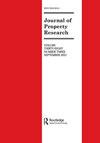Exploring sentiment-driven trading behaviour of different types of investors in the London office market
IF 2.3
Q2 URBAN STUDIES
引用次数: 3
Abstract
ABSTRACT We investigates the sentiment-driven trading behaviour of the four types of investors in the London office market, i.e. UK institutional investors, UK private investors, UK listed real estate companies/Real Estate Investment Trust (REIT)s and overseas investors. In addition, we examine the relationship between investor sentiment and property performance. Related indices are calculated to examine the existence of herding behaviour of different investors. We find that UK private investors follow a contrarian strategy to UK institutional investors and listed real estate companies/REITs and enter/exit the market at different points of time. UK institutional investors tend to follow the sentiment of UK listed real estate companies/REITs and overseas investors with lags. There is no evidence that overseas investors rely upon the sentiment of UK specialised property investors in their decision-making. We find the sentiment of different investors is influenced differently by market fundamentals. Yield and rental growth rate have significant impact on trading activity of overseas investors, but not on other investors. The stock market return and securitised real estate return have significant impact on the trading activity of UK institutional investor and overseas investor, but have no significant influence on the trading behaviour of UK private investor and listed real estate company/REIT.探索伦敦写字楼市场中不同类型投资者的情绪驱动交易行为
摘要:我们调查了伦敦写字楼市场上四类投资者的情绪驱动交易行为,即英国机构投资者、英国私人投资者、英国上市房地产公司/房地产投资信托基金和海外投资者。此外,我们还考察了投资者情绪与房地产表现之间的关系。计算相关指数是为了检验不同投资者羊群行为的存在。我们发现,英国私人投资者对英国机构投资者和房地产上市公司/房地产投资信托基金采取反向策略,并在不同时间点进入/退出市场。英国机构投资者倾向于追随英国上市房地产公司/房地产投资信托基金和海外投资者的情绪。没有证据表明海外投资者在决策时依赖英国专业房地产投资者的情绪。我们发现,不同投资者的情绪受到市场基本面的不同影响。收益率和租金增长率对海外投资者的交易活动有显著影响,但对其他投资者没有影响。股票市场回报和证券化房地产回报对英国机构投资者和海外投资者的交易活动有显著影响,但对英国私人投资者和房地产上市公司/房地产投资信托的交易行为没有显著影响。
本文章由计算机程序翻译,如有差异,请以英文原文为准。
求助全文
约1分钟内获得全文
求助全文
来源期刊

Journal of Property Research
URBAN STUDIES-
CiteScore
3.80
自引率
5.30%
发文量
13
期刊介绍:
The Journal of Property Research is an international journal. The title reflects the expansion of research, particularly applied research, into property investment and development. The Journal of Property Research publishes papers in any area of real estate investment and development. These may be theoretical, empirical, case studies or critical literature surveys.
 求助内容:
求助内容: 应助结果提醒方式:
应助结果提醒方式:


